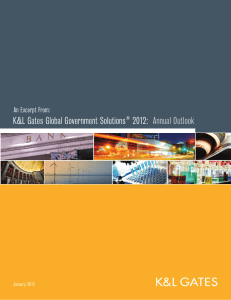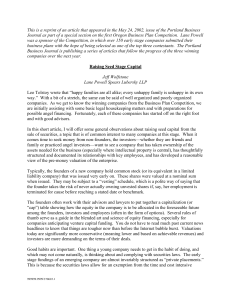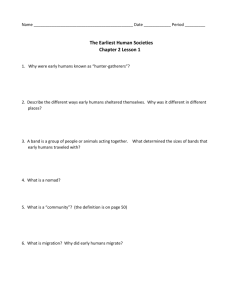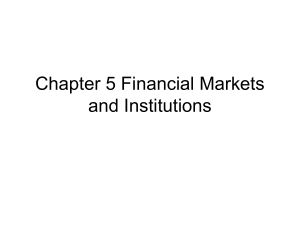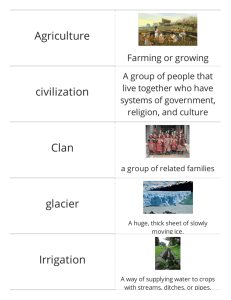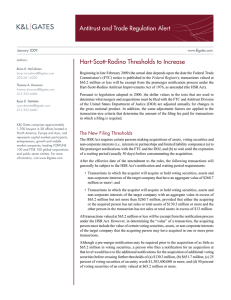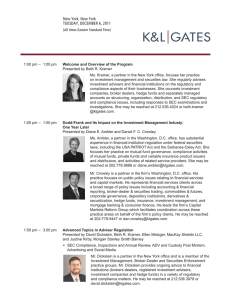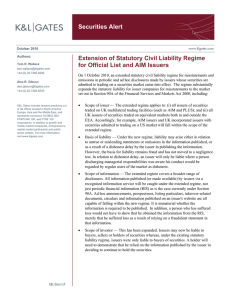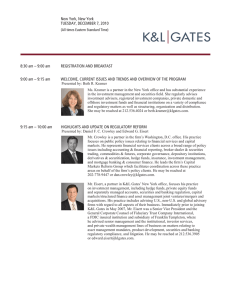Changes to the AIM Rules for Companies
advertisement
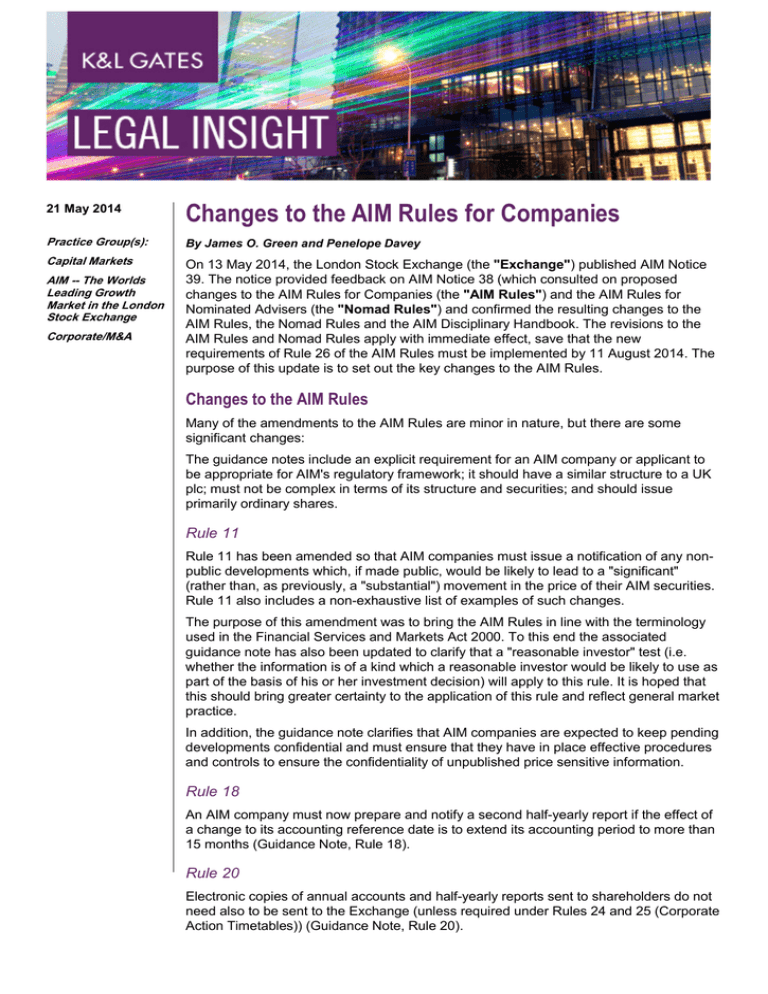
21 May 2014 Changes to the AIM Rules for Companies Practice Group(s): By James O. Green and Penelope Davey Capital Markets On 13 May 2014, the London Stock Exchange (the "Exchange") published AIM Notice 39. The notice provided feedback on AIM Notice 38 (which consulted on proposed changes to the AIM Rules for Companies (the "AIM Rules") and the AIM Rules for Nominated Advisers (the "Nomad Rules") and confirmed the resulting changes to the AIM Rules, the Nomad Rules and the AIM Disciplinary Handbook. The revisions to the AIM Rules and Nomad Rules apply with immediate effect, save that the new requirements of Rule 26 of the AIM Rules must be implemented by 11 August 2014. The purpose of this update is to set out the key changes to the AIM Rules. AIM -- The Worlds Leading Growth Market in the London Stock Exchange Corporate/M&A Changes to the AIM Rules Many of the amendments to the AIM Rules are minor in nature, but there are some significant changes: The guidance notes include an explicit requirement for an AIM company or applicant to be appropriate for AIM's regulatory framework; it should have a similar structure to a UK plc; must not be complex in terms of its structure and securities; and should issue primarily ordinary shares. Rule 11 Rule 11 has been amended so that AIM companies must issue a notification of any nonpublic developments which, if made public, would be likely to lead to a "significant" (rather than, as previously, a "substantial") movement in the price of their AIM securities. Rule 11 also includes a non-exhaustive list of examples of such changes. The purpose of this amendment was to bring the AIM Rules in line with the terminology used in the Financial Services and Markets Act 2000. To this end the associated guidance note has also been updated to clarify that a "reasonable investor" test (i.e. whether the information is of a kind which a reasonable investor would be likely to use as part of the basis of his or her investment decision) will apply to this rule. It is hoped that this should bring greater certainty to the application of this rule and reflect general market practice. In addition, the guidance note clarifies that AIM companies are expected to keep pending developments confidential and must ensure that they have in place effective procedures and controls to ensure the confidentiality of unpublished price sensitive information. Rule 18 An AIM company must now prepare and notify a second half-yearly report if the effect of a change to its accounting reference date is to extend its accounting period to more than 15 months (Guidance Note, Rule 18). Rule 20 Electronic copies of annual accounts and half-yearly reports sent to shareholders do not need also to be sent to the Exchange (unless required under Rules 24 and 25 (Corporate Action Timetables)) (Guidance Note, Rule 20). Changes to the AIM Rules for Companies Rule 21 Undertakings by a director or applicable employee to participate in an AIM company's fundraising (where any close period arises solely due to that fundraising being unpublished price sensitive information and that director or applicable employee's participation is on exactly the same terms as all other investors) will be excluded from the restrictions in Rule 21 on dealing in the AIM securities of that company (Guidance Note, Rule 21). Rule 26 Additional items have been added to the list of information that must be maintained on an AIM company's website. For example, such information must now include: • the AIM company's annual accounts for the last three years or since admission, whichever is the lesser; • details of the corporate governance code that the AIM company has decided to apply together with details of compliance with that code (and if no code has been adopted, a statement to that effect together with the AIM company's current corporate governance arrangements); • whether the AIM company is subject to the UK City Code on Takeovers and Mergers or any other such legislation or code in its country of incorporation or operation or any other provisions that it has voluntarily adopted; and • the date upon which the details of its significant shareholders were last updated. The increased visibility for investors of an AIM company's corporate governance arrangements has been supported by respondents to AIM Notice 38. In particular, the QCA has strongly welcomed this change and stated that it hopes that this additional visibility will help improve the level of corporate governance behaviour and reporting for AIM companies. Rule 41 A takeover effected by a UK scheme of arrangement has been included in the list of circumstances in which the Exchange might agree that shareholder consent is not required in respect of the cancellation of the admission of that company's AIM securities (Guidance Note, Rule 41). Rule 43 A new rule has been added to the AIM Rules which states that when an AIM company ceases to have a class of securities admitted to trading on AIM, the Exchange retains jurisdiction over the company for the purpose of investigating and taking disciplinary action in relation to breaches or suspected breaches of the AIM Rules at a time when that company was an applicant or had a class of securities admitted to trading on AIM. During the consultation pursuant to AIM Notice 38, concern was expressed on how the Exchange proposed to enforce this rule in respect of overseas companies and whether it would expect the AIM company's Nomad to assist with any such investigation. The Exchange has provided clarification that it would not expect an AIM company's Nomad to be the point of liaison for such an investigation. 2 Changes to the AIM Rules for Companies Summary The significant changes to the AIM Rules focus on the protection of investors by requiring AIM companies to provide investors with more detailed disclosure. Given that most of these changes have been welcomed by the respondents to AIM Notice 38 and are not likely to prove too onerous for AIM companies to comply with, these changes are a positive development. Should you require any further information about any of the matters contained within this alert or advice on how these changes may impact your company, please contact the authors or your usual K&L Gates contacts. Authors: James O. Green james.green@klgates.com +44.(0).20.7360.8105 Penelope Davey penelope.davey@klgates.com +44.(0)20.7360.8156 Anchorage Austin Beijing Berlin Boston Brisbane Brussels Charleston Charlotte Chicago Dallas Doha Dubai Fort Worth Frankfurt Harrisburg Hong Kong Houston London Los Angeles Melbourne Miami Milan Moscow Newark New York Orange County Palo Alto Paris Perth Pittsburgh Portland Raleigh Research Triangle Park San Diego San Francisco São Paulo Seattle Seoul Shanghai Singapore Spokane Sydney Taipei Tokyo Warsaw Washington, D.C. Wilmington K&L Gates practices out of 48 fully integrated offices located in the United States, Asia, Australia, Europe, the Middle East and South America and represents leading global corporations, growth and middle-market companies, capital markets participants and entrepreneurs in every major industry group as well as public sector entities, educational institutions, philanthropic organizations and individuals. For more information about K&L Gates or its locations, practices and registrations, visit www.klgates.com. This publication is for informational purposes and does not contain or convey legal advice. The information herein should not be used or relied upon in regard to any particular facts or circumstances without first consulting a lawyer. © 2014 K&L Gates LLP. All Rights Reserved. 3

